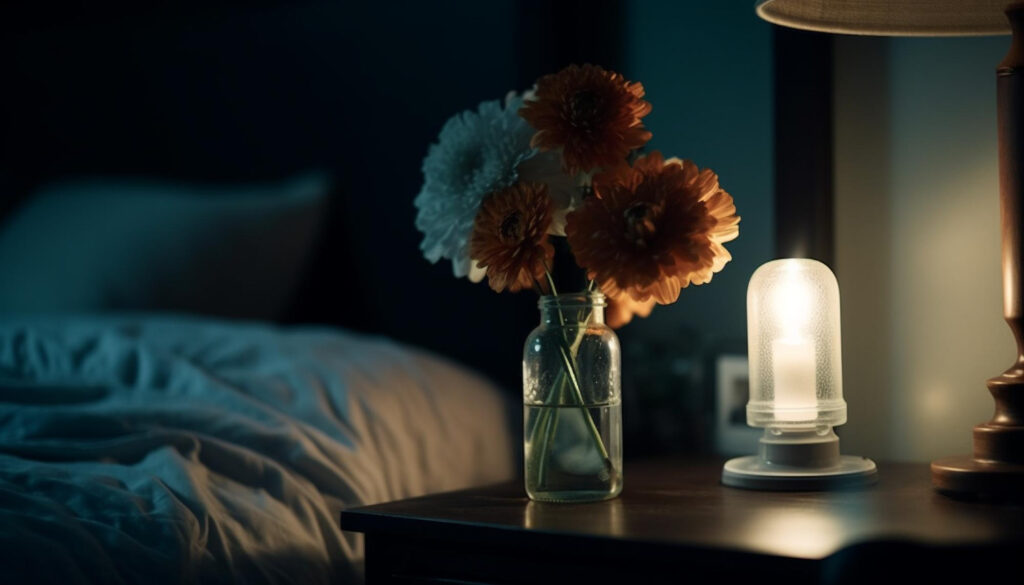Have you ever crawled into bed exhausted, only to find yourself tossing and turning for hours? Or perhaps you sleep through the night but wake up feeling like you haven’t rested at all? The culprit might be poor deep sleep quality—the most restorative phase of your sleep cycle.
Deep sleep (also called slow-wave sleep) is when your body repairs tissues, strengthens your immune system, and consolidates memories. Without enough deep sleep, even eight hours in bed might leave you feeling foggy and fatigued the next day.
The good news? Many factors affecting your deep sleep are entirely within your control. Let’s explore seven daily habits that might be secretly sabotaging your sleep quality—and what you can do about them.
1. Your Evening Screen Time Ritual
That “quick check” of your phone before bed often turns into an hour-long scroll session, doesn’t it? What you might not realize is how profoundly this affects your sleep architecture.
The blue light emitted by phones, tablets, and computers suppresses melatonin—your body’s natural sleep hormone. Even more concerning is the mental stimulation from content consumption, which keeps your brain in an alert state.
What you can try instead:
- Establish a “digital sunset” 1-2 hours before bedtime
- Use night mode or blue light filtering glasses if you must use devices
- Replace scrolling with reading a physical book or journaling
- Try the 3-2-1 rule: no caffeine 3 hours before bed, no work 2 hours before bed, no screens 1 hour before bed
Sarah from Portland shares: “I started putting my phone in another room at 9 PM every night. Within a week, I was falling asleep faster and waking up less during the night. I had no idea my evening Instagram habit was affecting me so much!”
2. Your Inconsistent Sleep Schedule
Our bodies thrive on routine, especially when it comes to sleep. Your circadian rhythm—your internal body clock—works best when you go to bed and wake up at consistent times, even on weekends.
When you hit the sack at 10 PM on weeknights but stay up until 2 AM on weekends, you’re essentially giving yourself recurring jet lag, disrupting the quality of your deep sleep phases.
What you can try instead:
- Set consistent sleep and wake times (within 30-60 minutes) every day
- Create a relaxing pre-bed routine that signals to your body it’s time to wind down
- If you must stay up late occasionally, keep your wake-up time consistent and take a short afternoon nap instead
3. Your Evening Eating and Drinking Habits
That late-night snack or nightcap might seem harmless, but your digestive system and liver have other opinions. When your body is busy processing food or alcohol, it can’t fully commit to the restorative processes that should happen during deep sleep.
Alcohol deserves special mention: while it might help you fall asleep initially, it significantly reduces REM and deep sleep in the second half of the night, leading to fragmented, poor-quality rest.
What you can try instead:
- Finish your last substantial meal 2-3 hours before bedtime
- If you need a small evening snack, choose sleep-promoting foods like a small handful of nuts, tart cherries, or herbal tea
- Limit alcohol consumption, especially within 3 hours of bedtime
- Stay hydrated throughout the day, but taper off liquid intake in the evening to minimize nighttime bathroom trips
4. Your Daytime Physical Activity (or Lack Thereof)
Your body was designed to move during the day and rest at night. When you don’t expend enough physical energy, your sleep drive—the biological process that makes you feel sleepy—isn’t properly activated.
Research consistently shows that regular physical activity improves sleep quality, particularly deep sleep. However, timing matters significantly.
What you can try instead:
- Aim for at least 30 minutes of moderate activity most days
- Get outside for morning sunlight exposure to help regulate your circadian rhythm
- Avoid intense exercise within 1-2 hours of bedtime (though gentle yoga or stretching can be beneficial)
- Consider breaking up long periods of sitting with short movement breaks throughout the day
Mark, a software developer, notes: “As someone who sits all day for work, I noticed my sleep quality plummeted during the pandemic when my daily commute walking was eliminated. Adding a 30-minute evening walk completely transformed my sleep quality.”
5. Your Bedroom Environment
Your sleep sanctuary might not be as conducive to deep sleep as you think. Temperature, light, noise, and even clutter can significantly impact how deeply you sleep.
The ideal sleep environment mimics a cave: cool, dark, and quiet. Even small amounts of light from electronic devices or outside sources can disrupt your melatonin production and prevent you from reaching the deepest sleep stages.
What you can try instead:
- Keep bedroom temperatures between 65-68°F (18-20°C)
- Use blackout curtains or a sleep mask to eliminate light
- Consider white noise or earplugs if sound disruptions are an issue
- Declutter your bedroom to create a calming atmosphere
- Invest in a supportive mattress and pillows that work for your sleep position
6. Your Stress Management Approach
That work deadline, family conflict, or financial worry doesn’t just disappear when your head hits the pillow. Stress and anxiety trigger cortisol production, which is basically kryptonite for deep sleep.
Many people unknowingly bring the day’s tensions to bed, making it nearly impossible for their nervous system to downshift into the relaxed state necessary for restorative sleep.
What you can try instead:
- Develop a “worry download” routine where you write down concerns before bed
- Practice deep breathing, progressive muscle relaxation, or meditation
- Create clear boundaries between work and rest time
- Consider starting a gratitude practice to shift your mindset before sleep
- If racing thoughts persist, get up briefly rather than lying in bed ruminating
7. Your Caffeine and Stimulant Consumption
That afternoon coffee might be more problematic than you realize. Caffeine has a half-life of 5-6 hours, meaning half the caffeine from your 3 PM pick-me-up is still in your system at 9 PM.
What’s more, some people are “slow metabolizers” of caffeine, meaning it affects them for even longer periods. Other hidden sources of caffeine—like chocolate, tea, and some medications—can contribute to the problem.
What you can try instead:
- Experiment with cutting off caffeine earlier (many sleep experts recommend noon as a cutoff)
- Be aware of hidden caffeine sources like chocolate, tea, and some pain relievers
- Read labels on energy drinks, pre-workout supplements, and even some “relaxation” teas
- Consider gradually reducing overall caffeine consumption to improve sensitivity
- Try substituting with herbal alternatives like rooibos tea or golden milk in the afternoon
Jennifer shares her experience: “I never thought my one small cup of afternoon coffee was an issue until I tracked my sleep quality with and without it. The difference was shocking—I get almost double the deep sleep when I cut caffeine after 11 AM.”
Putting It All Together: Your Deep Sleep Action Plan
Rather than trying to overhaul everything at once, consider focusing on one habit for a week or two before adding another. Small, consistent changes often yield the most sustainable results.
You might start by tracking your current sleep quality (either through a wearable device or simply noting how you feel upon waking) to establish a baseline. Then experiment with these habit adjustments to see what makes the biggest difference for your unique body and lifestyle.
Remember that sleep quality isn’t just about feeling good—it fundamentally affects your cognitive function, emotional regulation, immune system, and long-term health. Investing in better deep sleep might be the single most important health upgrade you can make.
When to Seek Additional Support
While lifestyle modifications can dramatically improve sleep quality for many people, persistent sleep issues might warrant professional guidance. Consider consulting a healthcare provider if you:
- Consistently experience poor sleep despite implementing these changes
- Snore loudly or gasp for breath during sleep (possible sleep apnea)
- Feel excessively sleepy during the day despite adequate sleep duration
- Have chronic pain or other medical conditions affecting your sleep

Disclaimer: This article is for informational purposes only and does not constitute medical advice. The suggestions provided are general recommendations and may not be appropriate for everyone. Please consult with a qualified healthcare provider before making significant changes to your health routine, especially if you have existing medical conditions.



